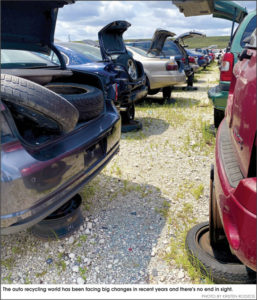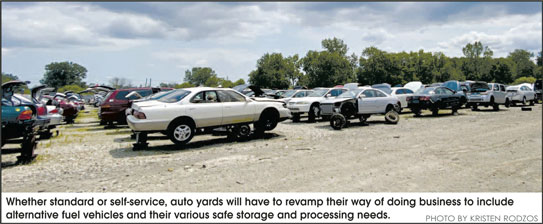by MAURA KELLER
As new and used vehicle availability continues to be problematic for consumers, and as EVs begin to take hold within the automotive industry, the automotive recycling industry has taken center stage. In fact, automotive recycling is a vital component of the global economy.
With the increased visibility of the industry and the impact automotive recycling is having on the marketplace, several legislative issues have emerged that could significantly impact it.
From laws relating to vehicle emissions and fuel efficiency standards, to proper lithium-ion battery recycling and stormwater runoff regulations at auto recycling facilities, these standards and restrictions are something companies need to maintain compliance with or face hefty fines.

EV Compliance Issues
According to John Cooley, founder, chief of products and innovation, Nanoramic Laboratories, a company that manufactures EV batteries and works with auto makers and recyclers, the labor for battery recycling is costly and time consuming, so making battery recycling economical is a challenge.
“This is why legislation is important – for ensuring battery recycling is integration with battery manufacturing practices,” Cooley said. “The recycling process includes transportation, shredding, separation of materials, neutralizing hazardous substances, smelting, and more.”
The Strategic EV Management Act, meant to expand the reuse and recycling of end-of-life electric vehicle batteries in federal fleet vehicles, was passed by the U.S. senate in December 2022. The bill calls for “federal agencies such as the General Services Administration and the Office of Management and Budget to collaborate with the U.S. Environmental Protection Agency (EPA), manufacturers and recyclers to create a strategic plan for reusing and recycling EV batteries.” The updated version of the bill also calls for “guidelines for disposing electric vehicle batteries that cannot be reused or recycled.”
In addition, the Inflation Reduction Act (IRA), passed into law by President Biden in August 2022, requires that EV manufacturers source 40 percent of critical battery minerals domestically or with free trade partners by 2024. One of the key provisions for speeding the transition from internal combustion engines to electric vehicles (EVs) is a tax credit up to $7,500 for U.S. consumers purchasing electric vehicles.
To stimulate domestic production of not only EVs but also their batteries, the IRA requires manufacturers to provide verifiable evidence that “large percentages of material sourcing and manufacturing take place within the U.S. or in a partner country with a free trade agreement.”
On the state level, in August 2022, the California Air Resources Board approved the California Governor’s Executive Order N-79-20 that established a target of 100 percent of in-state sales of new passenger cars and trucks will be zero-emission by 2035. These zero-emission vehicles (ZEVs) will further drive the advancement of charging and refueling infrastructure in California in order to support these vehicles. Other states are expected to pass similar measures in the near future.

Globally, there are proposed EU regulations that will require lithium-ion batteries to have minimum levels of recycled content (12 percent cobalt; 85 percent lead, 4 percent lithium and 4 percent nickel) in 2027. From 1 January 2035, these levels will be further increased (20 percent cobalt, 10 percent lithium and 12 percent nickel). This effort, on the part of the European Commission is expected to have a trickle-down effect in other parts of the world, including the U.S. According to the European Commission, in order to have a significant impact on the EU battery market, “these are legally binding and adopted at the EU level. This modern regulatory framework is essential to provide legal certainty to the economic operators across the whole battery value chain, paving the way for necessary large-scale investments to respond to the market demand.”
To help automotive recyclers get up to speed and stay on top of the ever-changing EV battery regulations by state, the Automotive Recyclers’ Association provides a series of training modules and certification programs for the EV segment of the industry.
Other Legislative Efforts
In addition to the wealth of attention being paid to the proper handling, recycling and disposal of EV batteries on the part of automotive recyclers, the industry is also facing additional environmental regulations, such as bans on the use of certain hazardous materials or chemicals, when dealing with certain parts or materials used in recycling. In order to meet these environmental regulations automotive recyclers will need to invest in additional safety protocols and equipment.
One area of concern that impacts automotive recyclers is in the area of catalytic converter theft. As we’ve seen in recent years, the theft and trafficking of catalytic converters are at an all-time high. To assist law enforcement nationwide with the growth of catalytic converter theft the Preventing Auto Recycling Theft (PART) Act was recently introduced in the U.S. Senate. The PART would require catalytic converters to be marked with identification numbers on most vehicles. As part of the Act, automotive recyclers would be responsible for record-keeping improvements for the catalytic converters they handle.
Many states have also introduced their own legislation intended to curb catalytic converter theft. For instance, Minnesota proposed legislation that restricts automotive recyclers from buying catalytic converters without documentation about how it was obtained by the seller. And in New Jersey, a proposed bill states that “a core recycler is not permitted to purchase or attempt to purchase a catalytic converter, in whole or in part, if the catalytic converter is not attached to a motor vehicle at the time of sale or attempted sale, unless the seller is a used automotive parts dealer or an automotive repair company.”
Because of the chemicals and solvents automotive recyclers handle on a regular basis, the industry is also facing evolving environmental compliance rules. The Clean Water Act, for example, states that operators of “discharges associated with industrial activity” are required to obtain a National Pollutant Discharge Elimination System permit to regulate storm water pollution runoff. As part of this Act, automotive recyclers are required to have storm water pollution prevention plans in place.
To further help auto recyclers navigate this particular compliance arena, the EPA sponsors partnerships with industry, academic institutions, environmental groups, and other agencies to provide 15 sector-specific Compliance Assistance Centers. On specific center, the Environmental Compliance for Automotive Recyclers Center (ECAR) was established by the EPA and the Automotive Recyclers Association to provide state-by-state breakdowns of environmental compliance requirements specific to the states in which the automotive recycler is operating.
In October 2022, the EPA joined industry stakeholders in renewing a memorandum of understanding (MOU) with the National Vehicle Mercury Switch Recovery Program (NVMSRP) to reduce mercury air emissions. Initially developed in 2006, the NVMSRP MOU is a collaboration to reduce mercury air emissions by removing mercury from the stream of steel scrap originating from the retirement of cars and trucks. To date, the program, which involves more than 10,000 recyclers, has prevented the release of more than 8.2 tons of mercury into the atmosphere by removing and recycling more than 7.4 million automotive mercury switches.
Robin Wiener, ISRI president, said, “The extension of the National Vehicle Mercury Switch Recovery Program assures continuity of an important program for recyclers, the steel industry, and the auto industry, that benefits the environment. The program continues the safe and secure removal of mercury switches from vehicles. ISRI members who handle end-of-life vehicles will be able to continue to participate in and benefit from this valuable environmental program. We are proud to continue our partnership with the EPA and other signatories on this very important effort.”
Published in the March 2023 Edition of American Recycler News







